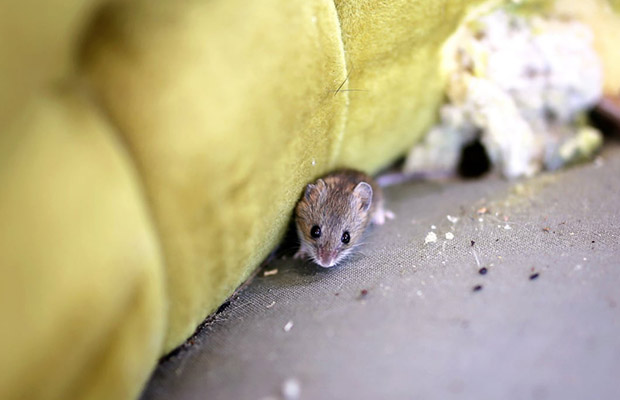
Want to know how to keep mice away from your bed? Nobody desires to find feral mice inside their house. They shouldn’t be seen around your bed or in your pantry, and you don’t want to see them crawling through it. Yet, if you hear scurrying in your bedroom at night or find mouse droppings and urine, you need to take proactive measures. The last thing you want is for a mouse to start destroying your bedding or for you to contract a disease from it. So let’s look at how to prevent mice from entering your bed.
We’ll go over methods you can use to prevent mice from hanging out in and around your bed.
Table of Contents
How to Keep Mice Away from Your Bed?
Avoid eating in your bedroom, clear the space of clutter, use barrier techniques to keep mice out, let your pets in, and seal any openings that lead to your bedroom.
These techniques range in complexity, with some being more straightforward than others. Let’s break down these different methods of keeping your bed area mouse-free. You’ll be able to get the rest you need and deserve in this manner.

1. Look for Mouse Access Points
You should start by looking for potential entry points for mice into your room. Mice have the ability to fit their bodies into incredibly small spaces. Therefore, you should think about searching for holes that are at least the size of a dime. Patch them up with caulk or fill them in with steel wool before patching them up with drywall spackle.
If you had holes drilled into your closet for cable access, some mice can get through them, too. If your bedroom has a drop ceiling, you should also look up there. Find the holes and block them off. Look for any potential entry points for mice, including the space under your door, by using your imagination. It should be possible to keep them from entering using a bristle door sweep.
2. Let Your Pets Have Access to Your Room
Nothing scares mice away from an area faster than the presence of a predator. Cats kept as pets are known to be skilled hunters who kill mice for food and fun. So, let your cat sleep in your room or make sure you bring their bed into your room at night. A mouse should be discouraged from exploring your bedroom simply based on the smell.
3. Try Using Barrier Methods to Make Mice Avoid Your Room
Another option you have is to put smells around your bed that mice do not like. For instance, a lot of people use cotton balls soaked in peppermint oil extract to deter mice. Mice can be repelled by the peppermint’s potent aroma.
Dryer sheets are yet another less smelly option for your bedroom. Dryer sheets, particularly Bounce brand ones, do not appeal to mice. You can easily stow a box of these underneath your bed to help ward off mice. However, this is not a guaranteed method of preventing mice from entering. Dryer sheet smell is not a favorite of all mice; however, some are more sensitive to it than others.
4. Remove Clutter in Your Room
Mice require hidden areas. These tiny mammals are aware that they will suffer greatly if anyone or anything sees them. When they do move, they prefer to stay close to the baseboards because of this. More importantly, they hide out behind clutter or furniture.
The things that mice require to feel safe and move about an area will be removed if you reduce the piles of clothing, blankets, garbage, and other clutter in your room. Make sure to pack your bedding properly and maintain a neat and organized space. You won’t have to be concerned about what is buried beneath the bed in the piles of clothes this way.
5. Stop Eating in Your Room, Or Clean Meticulously After
Last but not least, you need to quit eating in bed. Any time that you bring food into your bedroom, you’re rolling out the welcome mat for mice. You might not notice when someone leaves cereal bowls half-full or when you leave crumbs around your home.
Also Read: How To Keep Cockroaches Away At Night?
Can Mice Climb Walls and Ceilings?
After finding evidence of mouse activity in high-up locations in their homes, many homeowners ask, “Can mice scale ceilings and walls?” Although mice can’t overcome gravity by crawling across ceilings like roaches can, evidence of mice in high places indicates that mice can, at least somewhat, climb walls. These rodents can climb textured or angled walls and have surprising long vertical jumps. They can also fairly easily climb ropes and curtains, which is another way they might gain access to those high places in your house.
As a result, a homeowner might have found mouse droppings on top of a cabinet or a mouse hole that is closer to the ceiling than the floor. A wall’s top may also have greasy, discolored tracks left by rodents who have been moving along cabinetry, rafters, or crown molding while rubbing up against the wall.
Why mice and rats chose to live in their home rather than someone else’s is another frequent query from frustrated homeowners.
What Attracts Mice and Rats to Your Home?
When rodents are discovered living or reproducing in homes, attics, or garages, many people wonder what draws mice and rats to their residences and how to keep them out.
Some key reasons why rodents might enter your home include:
- Since when have you cleaned up? Mice are drawn to places where people have left food out on counters or stovetops, failed to clean up crumbs, and let garbage cans overflow. Mice are not picky eaters and will happily consume anything you exclude.
- There is water. Mice need easy access to water, just like they need food. Mice and other pests may gather in your home in search of water anywhere there is an accumulation of water, such as in pet water bowls or from leaking pipes.
- It’s cozier inside than outside. Mice require a warm, cozy place to live in order to build their nests, have babies, and survive, in addition to food and water. Any cracks or holes in the exterior of your house could serve as points of entry for mice, allowing them to enter your walls and eventually your interior living space. Mice can fit through surprisingly small spaces with ease. In actuality, a fully grown mouse can squeeze through a dime-sized opening.
Despite the fact that some people find mice to be rather harmless or even cute, these unwelcome visitors actually pose a serious threat to our loved ones, including our pets. It is well known that mice can transmit serious diseases like salmonella and hantavirus to people. In addition, mice-borne diseases like Lyme disease can be passed on to people by ticks and fleas.
And despite their small size, mice can be a serious problem when they invade a house. Mice can cause significant damage when they chew through drywall, PVC pipes, or even electrical wiring because, like other rodents, they must gnaw frequently to keep their continuously erupting front teeth filed down.
Additionally, the bacteria and viruses in their urine and feces may be harmful, causing illness in both humans and animals. These substances soak through floors and ceilings if they are not cleaned thoroughly, causing expensive property damage that must be repaired.
You might wonder what would happen if your cat ate a rodent given the diseases that these animals can carry.
